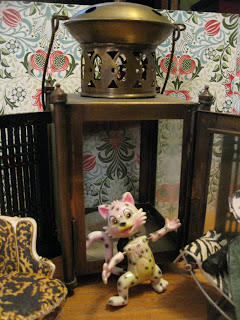Liberation Road Detour
 It's often been said that some of television's greatest offerings never actually made it to the small screen. Never has this been more true than it was with the loss of 1971's Liberation Road.
It's often been said that some of television's greatest offerings never actually made it to the small screen. Never has this been more true than it was with the loss of 1971's Liberation Road.By the early 1970s, Nancy Kulp had greatly tired of her role as "Miss Jane" on The Beverly Hillbillies and longed to leave this lucrative gig. Kulp and Irene Ryan both signed on for the show because, as strict Dadaists, they felt the scripts offered the type of in-your-face nihilistic abrasiveness that was an offense to the class system. Ryan dated Tristan Tzara in the 1920s when they met a young Hungarian named Grevtin Hausheuerblach whom they renamed Zza Zza Gabor and launched her on her 80+ year as a deconstructionist performance artist. Ryan was able to inject a dose of Dadaism in most episodes of The Beverly Hillbillies, as exhibited in this clip where she demonstrates both her strict adherence to the surreal and her previously unrealized potential as a seductive chanteuse.
As that series was winding down, Kulp and Odetta were approached to shoot a pilot and the first five episodes of Liberation Road. Building on the cultural shifts afoot in films like Easy Rider and Diary of a Mad Housewife, the series was billed as a mix of Kerouac's On the Road and The Waltons with a feminist twist.
Kulp and Odetta's "friendship" was an open secret in Hollywood for years, and Kulp had helped Odetta get her occasional acting gigs on series such as Have Gun Will Travel but longed for the opportunity to work together.
The basic premise of the series was that Kulp was a traditional Chicago housewife during the Great Depression who flees an abusive marriage with her two children and teams up with Odetta, a roving troubadour. They set out on Route 66 and meet a series of challenges and social ills ranging from racism, labor abuse and sexism. Each episode was liberally laced with original Odetta tunes, and she usually closed with The Internationale or other anthems.
 Though Kulp's high visibility lured ABC to green light the pilot, they soon objected to most of the scripts, which included many collaborators including Sam Shepherd and Susan Sontag. First they complained that it was inappropriate to have children raised by two women, but Kulp pointed out that the Clampetts on The Beverly Hillbillies were an even less traditional family.
Though Kulp's high visibility lured ABC to green light the pilot, they soon objected to most of the scripts, which included many collaborators including Sam Shepherd and Susan Sontag. First they complained that it was inappropriate to have children raised by two women, but Kulp pointed out that the Clampetts on The Beverly Hillbillies were an even less traditional family.Tensions were high on the set as last minute changes to the script were ignored by Kulp and Odetta. By the time they had wrapped episode three and the pilot was about to air, ABC got cold feet after getting a call from the Nixon White House, and the whole series was scrapped. Whereabouts of tapes of those three episodes and the two hour pilot is still unknown. However, rumors have been buzzing over on TMZ that an extant copy recently surfaced in the Czech Republic and will be released by the Criterion Collection in 2013.

 Kulp exited show biz for a while after this sour experience, entering politics with an unsuccessful bid for the U.S. House in Pennsylvania in 1984. Buddy Ebson famously campaigned against her, stemming from a long-standing tension between the two dating back to a party Kulp hosted in 1968 where he mistook Odetta for the maid and kept asking her for more crab dip.
Kulp exited show biz for a while after this sour experience, entering politics with an unsuccessful bid for the U.S. House in Pennsylvania in 1984. Buddy Ebson famously campaigned against her, stemming from a long-standing tension between the two dating back to a party Kulp hosted in 1968 where he mistook Odetta for the maid and kept asking her for more crab dip.In the late 1980s, Kulp had moderate success with her yoga and meditation tapes called Now and Zen aimed at post-50 women seeking fitness and serenity. Poorly marketed initially, the tapes were later hawked on the Home Shopping Network as Sweatin' to the Oldies with Miss Jane much to Kulp's horror. After Kulp's death in 1990, Odetta never fully recovered from the loss.
Labels: 1970s, Irene Ryan, Nancy Kulp, Odetta, television

























































